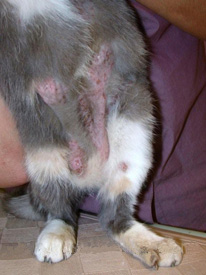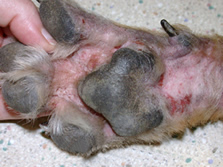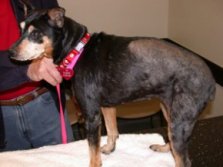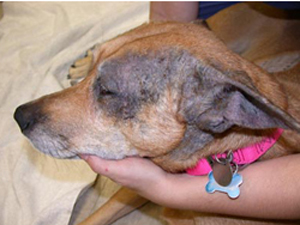

Introduction: Pets with allergies to pollen, grass, or dust are affected with atopic dermatitis, or atopy. People with allergies have symptoms such as runny eyes and sneezing, but animals with allergies more commonly show symptoms such as scratching, licking of the feet, and recurrent skin and ear infections. These symptoms may appear only during certain seasons, if the main offending allergens are seasonal pollens, but can occur throughout the year if the allergens persist in the environment year round (such as housedust mites and human dander). Atopic dermatitis typically starts in dogs between the ages of 6 months to 5 years; in cats, atopy can occur at any time of life. In dogs, there is an increased incidence of allergies in certain breeds such as terriers, Cocker spaniels, Labradors, golden retrievers, Shar peis, and German shepherds, however any dog breed can be affected. The diagnosis of atopy is made by considering the symptoms, seasonality, and response to medications. Additionally measures must be taken to ensure no other similar itchy skin diseases such as food allergy, skin parasites, or skin infections are present. Once the clinical diagnosis of atopy has been made, the treatment options include treatment of allergic symptoms with topical and oral medications, or allergy testing and desensitization injections to treat the underlying cause of the itching.
Once the clinical diagnosis of atopy has been made, the treatment options include treatment of allergic symptoms with topical and oral medications, or allergy testing and desensitization injections to treat the underlying cause of the itching.
Symptomatic Allergy Treatment: Allergic animals with mild or very seasonal symptoms can often be managed by just using medications to treat their symptoms. Symptomatic medications include topical products such as shampoos, conditioners, and sprays, as well as oral medications such as antihistamines, fatty acids, steroids, and cyclosporin.
Topical therapy: Shampoos, conditioners, and sprays used for allergies usually contain ingredients that help reduce itching such as oatmeal, topical anesthetics, antihistamines, or steroids. Allergic dogs benefit from frequent bathing not only because of the anti-itch ingredients, but because bathing helps to reduce allergens that are accumulated on the skin and coat. Due to animals’ skin pH differences compared to humans, shampoos designed specifically for pets should be used. Weekly bathing and daily rinses or wipedowns with a wet washcloth are usually recommended. It is important that the shampoos be gentle (avoid tar and benzoyl peroxide products unless the dog is very greasy) so that the skin and coat do not become dry. Note that topical products that contain steroids (such as hydrocortisone, betamethasone, and triamcinolone) should be used carefully, as excessive use of topical steroids can predispose a pet to skin infections, and can cause the skin to become excessively thin or create blackheads.
Note that topical products that contain steroids (such as hydrocortisone, betamethasone, and triamcinolone) should be used carefully, as excessive use of topical steroids can predispose a pet to skin infections, and can cause the skin to become excessively thin or create blackheads.
Antihistamines: Oral antihistamines (such as benadryl, clemastine, chlorpheniramine, and hydroxyzine) are helpful to reduce itching in 30-40% of allergic pets; they are not as potent as steroids, but also do not have unwanted steroid side effects. No antihistamine is better or more potent than another; just as in humans, multiple antihistamines often must be tried to find the best one for each individual pet. They also need to be consistently given two to three times daily for benefit, and the dose requirements for pets are usually higher than for people (so it is important to ask your veterinarian about the right dose for your pet). In some pets, side effects can occur such as sleepiness or excitation. When buying over the counter antihistamines, it is very important to select products which do not contain pain killers or decongestants. Antihistamines may not be appropriate if pets have certain medical conditions such as seizures, glaucoma, hypertension, or urinary retention.
Fatty acids: Omega 3 and 6 essential fatty acids are derived from sources such as fish oil, flaxseed oil, and vegetable oils. They have mild anti-inflammatory effects on the skin, as well as help to decrease skin dryness. They have to be given for 1-3 months before a beneficial effect is seen. An oral mixture of omega 3 and 6 fatty acids appears to be ideal for treatment of allergic dermatitis in dogs, and there are multiple combination products manufactured for pets, available in capsule, powder, liquid, or chewable tablet form. Fatty acids also work synergistically with antihistamines to help reduce allergic skin inflammation and itching. They may not be appropriate for use in pets with other medical disorders such as high cholesterol or clotting problems.
An oral mixture of omega 3 and 6 fatty acids appears to be ideal for treatment of allergic dermatitis in dogs, and there are multiple combination products manufactured for pets, available in capsule, powder, liquid, or chewable tablet form. Fatty acids also work synergistically with antihistamines to help reduce allergic skin inflammation and itching. They may not be appropriate for use in pets with other medical disorders such as high cholesterol or clotting problems.
Steroids: Injectable or oral steroids such as cortisone or prednisone have many pros and cons in the treatment of allergies in pets. They are inexpensive and work quickly and effectively to reduce itching, and for short term use they are relatively safe. However steroids have numerous side effects, such as increased thirst, urination, hunger, and weight gain. With prolonged use at high doses, steroids cause liver enlargement and increased liver enzymes, can cause high blood pressure and kidney disease, weakened muscles and ligaments, infections of the skin and bladder, and thinning of the skin and hair loss. Animals that are treated with long-term steroids should have physical examinations, bloodwork and urine testing regularly to monitor for side effects. Additionally, other options to treat their allergies and to reduce their dependence on steroids should be tried.
YOU MIGHT ALSO LIKE












